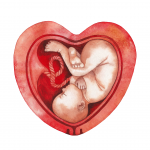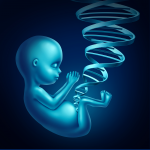The knowledge of a baby being big or small is just data, not meaningful information. Context is key.
motherhood
Branding normal phases of development and transitions have become a thing, mainly to sell books more than identify any new discovery. That said, the first three months of a baby’s life after birth and mom’s postpartum period is a rather unique time for many reasons.
Ideology, not medical reality, has infected much of modern parenting. The most compelling pediatric articles -- centered around misguided activism that still persists -- focused on infant feeding, vaccines and mom-shaming.
The negative impact of (1) "at-all-costs" breastfeeding campaigns, (2) the political zeal of "lactivism" and (3) societal pressures have done a proven disservice to women and families. So much so that formal health policy had to be changed.
Given how well women propagated the species despite all kinds of past health scares, should today's mothers panic about eating a piece of sushi? Well, yeah, though they needn't worry about coffee or BPA, despite litigation groups like Center for Science in the Public Interest long insisting those things are ruining families.
A new study published in the journal Pediatrics concludes that an early, scheduled delivery is linked to poor childhood development at school age. When and how a baby is born requires assessing a multitude of influencing factors. Educating the masses on the risks and benefits of planned birth for non-medical reasons is very important in making a truly informed decision.
Welcome to the conclusion of our three part series discussing the science behind director Kathleen Gyllenhaal's latest documentary, IN UTERO. "To Avoid Adult Dysfunction Start 'IN UTERO'" took a deeper look at the health ramifications of toxic stress in prenatal life and its role in contributing to adult disease. Part I of our Q&A with Gyllenhaal emphasized health, Hollywood, how a story gets told and the parallels between funding for film and scientific research. In Part II, we explore her insights into motherhood and the impact of her recent film.
Welcome to our three part series discussing the science behind director Kathleen Gyllenhaal's latest documentary, IN UTERO. "To Avoid Adult Dysfunction Start 'IN UTERO'" took a deeper look at the health ramifications of toxic stress in prenatal life and its role in contributing to adult disease. Part I of our Q&A with Gyllenhaal emphasizes health, Hollywood, how a story gets told and the parallels between funding for film and scientific research.
Welcome to our three part series discussing the science behind director Kathleen Gyllenhaal's latest documentary, IN UTERO. In Part II of the Q&A, we explore her insights into motherhood and the impact of her recent film.
http://acsh.org/news/2016/10/25/kathleen-gyllenhaal-health-meets-hollywood-qa-10351Welcome to our three part series discussing the science behind director Kathleen Gyllenhaal's latest documentary, IN UTERO. This article takes a deeper look at the health ramifications of toxic stress in prenatal life and its role in contributing to adult disease. Part I of our Q&A with Gyllenhaal emphasizes health, Hollywood, how a story gets told and the parallels between funding for film and scientific research. In the concluding Part II Q&A, we explore her insights into motherhood and the impact of her recent film.








